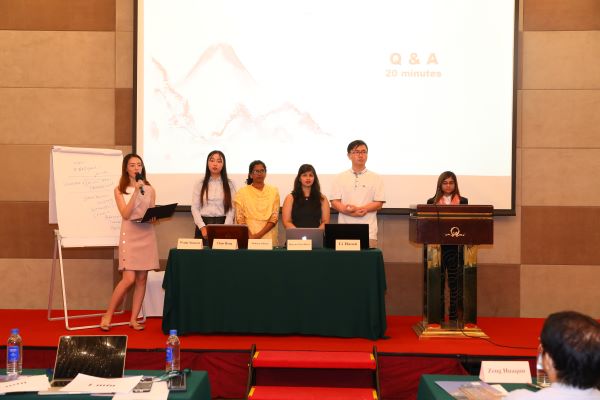The First Academic Salon of Summer Program 2019

Amidst the excitement of scholarly exchange, the first academic salon of the Summer Program was held at the Harbourview Millennium Hotel on July 16th, 2019. Five students from various ethnic backgrounds and academic focuses volunteered to share their insights of the international law system from different perspectives.
Wang Xing Ceng kicked off the salon with her introduction about a field her research involved in: the evidentiary privilege of international investment arbitration.She pointed out the controversy within the existence and application of the privilege by referring to the Zhinvali v. Georgia case. “How do we deal with it?” asked her with forceful articulation as she led the audience into the argument and defense in the One Belt One Road investment disputes.
MafruzaS ultana then delivered a poignant combination of a beautiful country and a tragichistory— the Bangladesh perspective of the Rohingya Crisis. As the mostpersecuted, misrepresented, and misunderstood ethnic community of Bangladesh, the Rohingya group migrated from Myanmar as refugees and suffered from the lack of international response and the insufficient bilateral agreement between the two countries. Mafruza explored the deadlock between treaties and customary international law, and inspired the audience to contemplate about the questions remained.
The lens was then shifted from humanitarian to economics. Li Hao En analyzed the WTO compliance of new surrogate country method in the EU. He started by demonstrating the problems concerning article 15 of the protocol on China’s assassin to the WTO and trade protectionism. Dissecting the new methods of EU anti-dumping rules, Hao En indicated the violation of EU “market distortion” legislation under WTO and its lack of legitimacy.
After a short break, Bhawna Chowdhary started off her presentation by engaging the audience through her own anecdotes, which provided with a fresh glimpse into the varying prices of goods across borders. In her humor and eloquence, she displayed the types, meaning, and identification of subsidies. She closed off by exploring the problem within the privilege of subsidized industry, and whether it was a misconception or reality.
Last but not the least, Chen Hong presented the application of the principle of special and differential treatment and China’s position under the background ofthe Sino-US friction background. He redefined “developing countries” with both traditional perspective and modern insight. After his thorough lecture, the audience gained a clearer view of China’s participation and position amidst the friction.
Followingthe Q&A section, Prof. Ruth Wedgwood marveled at the number of female presenters on stage. She expressed her gratification to the women taking over amale territory, and praised the students’ elegant integration of theory intopractice. “After all,” she said “law is a matter of beauty and kindness.” Being impressed by the students’ courage of undertaking international hot issues, Prof. Zeng Huaqun then showed his admiration and encouragement of such exchange among participants. He looked forward to the thriving of these future leaders.
Report by Skye Wu
